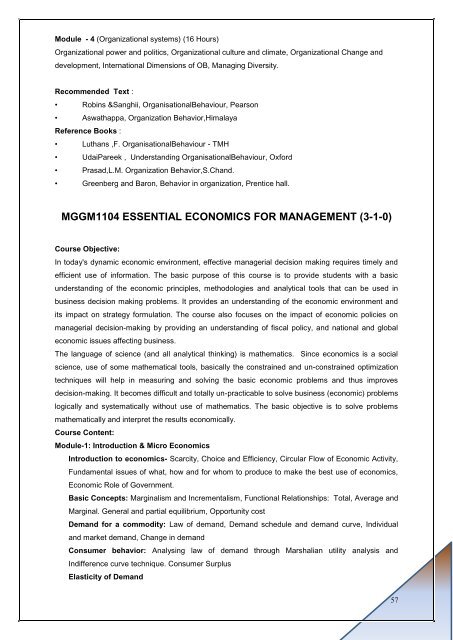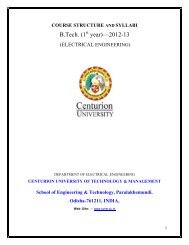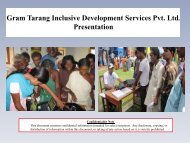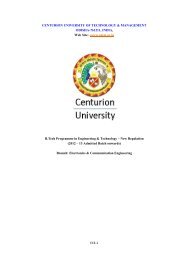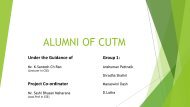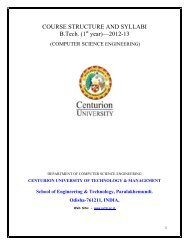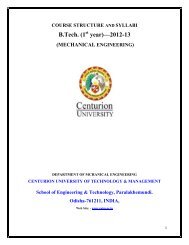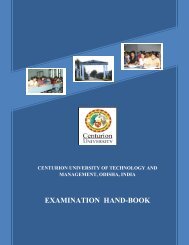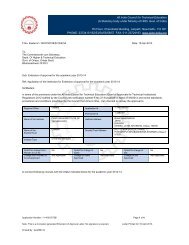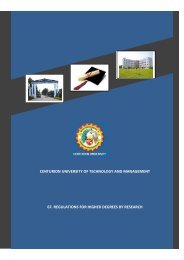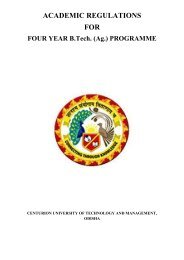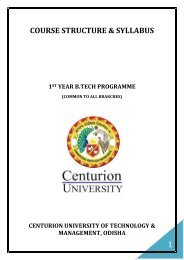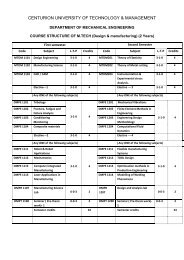CSE - Centurion University
CSE - Centurion University
CSE - Centurion University
Create successful ePaper yourself
Turn your PDF publications into a flip-book with our unique Google optimized e-Paper software.
Module - 4 (Organizational systems) (16 Hours)<br />
Organizational power and politics, Organizational culture and climate, Organizational Change and<br />
development, International Dimensions of OB, Managing Diversity.<br />
Recommended Text :<br />
• Robins &Sanghii, OrganisationalBehaviour, Pearson<br />
• Aswathappa, Organization Behavior,Himalaya<br />
Reference Books :<br />
• Luthans ,F. OrganisationalBehaviour - TMH<br />
• UdaiPareek , Understanding OrganisationalBehaviour, Oxford<br />
• Prasad,L.M. Organization Behavior,S.Chand.<br />
• Greenberg and Baron, Behavior in organization, Prentice hall.<br />
MGGM1104 ESSENTIAL ECONOMICS FOR MANAGEMENT (3-1-0)<br />
Course Objective:<br />
In today's dynamic economic environment, effective managerial decision making requires timely and<br />
efficient use of information. The basic purpose of this course is to provide students with a basic<br />
understanding of the economic principles, methodologies and analytical tools that can be used in<br />
business decision making problems. It provides an understanding of the economic environment and<br />
its impact on strategy formulation. The course also focuses on the impact of economic policies on<br />
managerial decision-making by providing an understanding of fiscal policy, and national and global<br />
economic issues affecting business.<br />
The language of science (and all analytical thinking) is mathematics. Since economics is a social<br />
science, use of some mathematical tools, basically the constrained and un-constrained optimization<br />
techniques will help in measuring and solving the basic economic problems and thus improves<br />
decision-making. It becomes difficult and totally un-practicable to solve business (economic) problems<br />
logically and systematically without use of mathematics. The basic objective is to solve problems<br />
mathematically and interpret the results economically.<br />
Course Content:<br />
Module-1: Introduction & Micro Economics<br />
Introduction to economics- Scarcity, Choice and Efficiency, Circular Flow of Economic Activity,<br />
Fundamental issues of what, how and for whom to produce to make the best use of economics,<br />
Economic Role of Government.<br />
Basic Concepts: Marginalism and Incrementalism, Functional Relationships: Total, Average and<br />
Marginal. General and partial equilibrium, Opportunity cost<br />
Demand for a commodity: Law of demand, Demand schedule and demand curve, Individual<br />
and market demand, Change in demand<br />
Consumer behavior: Analysing law of demand through Marshalian utility analysis and<br />
Indifference curve technique. Consumer Surplus<br />
Elasticity of Demand<br />
57


